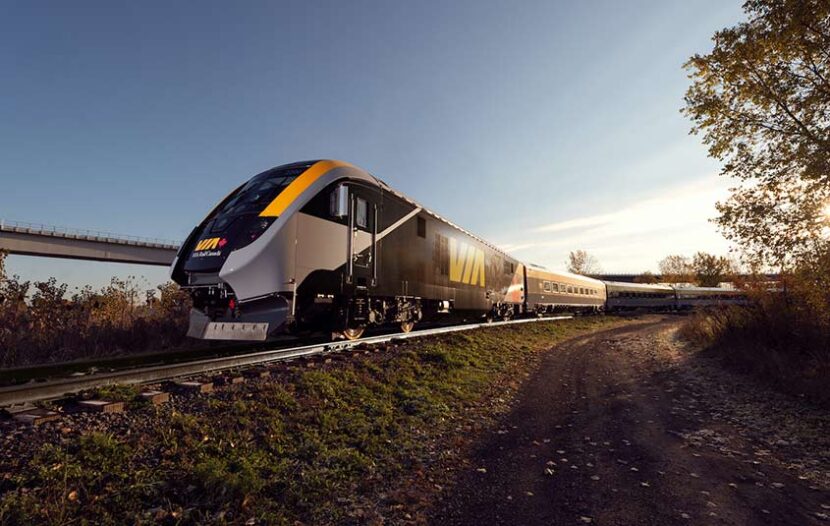MONTREAL _ The federal government should move toward giving Via Rail trains formal right of way on the tracks over freight trains, says Via Rail chief executive Mario Peloquin.
In an interview, the Crown corporation CEO said the measure would reduce trip disruptions prompted by Canada’s two main freight railways _ whose tracks Via runs on _ and vastly improve performance on periodically tardy passenger trains.
It would also align Canada with regulations in the United States, where Amtrak passenger cars enjoy priority.
Ideally, the measure would go hand-in-hand with a passenger bill of rights comparable to the one now in place for air travellers to ensure customers receive compensation for long delays, Peloquin said.
“Now, we have no class, no prioritization. There was talk about putting rules in place prioritizing passenger rail trains. I would love that, together with a bill of rights forpassengers similar to what we see in the airline industry, as imperfect maybe as it is,” said Peloquin, who stepped into the top job at Via in June.
“All we can commit right now without those rules is that we’ll get people where they want to go _ eventually.”
The air passenger rights charter, rolled out in 2019, spells out penalties for airlines that breach the rules and mandates passenger compensation for problems such as lost luggage and trip delays or cancellations _ up to $2,300 and $1,000, respectively.
The regulations are currently undergoing an overhaul following criticism they contain loopholes for airlines to avoid compensation, and after thousands of customer complaints to the regulator.
In the quarter ended June 30, Via saw just 62 per cent of its trains arrive on time, which nonetheless marked an improvement from 53 per cent a year earlier.
Former transport minister Omar Alghabra told media over the summer he was looking into measures to improve travellers’ experience amid Via’s shaky performance, including through a bill of rights.
Not all rail industry players are on board.
John Corey, president of the Freight Management Association of Canada (FMA), said giving Via right of way over the country’s two Class 1 rail operators _ Canadian National Railway Co. and Canadian Pacific Kansas City Ltd. _ would further pressure an already strained supply chain, as would a rights charter.
“Prioritizing passenger rail service over freight rail service would be the tail wagging the dog. Freight railways, their customers and Canadians in general would be subsidizing the few people using the passenger rail system,” Corey said.
“Currently, freight rail service in Canada is not optimal from a shipper’s point of view … Any initiative that would make freight rail service less efficient would not be supported by the FMA.”
Corey added that he can sympathize with travellers _ “I have taken Via and sat on a siding waiting for the freight train to pass.”
Under a bill of rights for riders, Peloquin said, CN or CP could well be the ones to pay up in the event of a Via trip disruption _ if it stems from their actions _ further incentivizing smooth operations along the line.
But it could also cost Via, which already contends with cash problems. In its second quarter, operating losses before government funding hit $120 million. The organization has not reached a full-year profit since 2017.
Peloquin pointed out that’s the case for passenger rail companies globally, many of which are government-owned, publicly subsidized or part of a diversified business. He framed Via as a public utility serving far-flung populations: “It is an essential need in a lot of locations.”
Despite that need, trip times have lengthened.
Two decades ago, riders could board an express train in Montreal’s downtown Central Station and arrive at Toronto’s Union Station about four hours after departure, said Greg Gormick, who heads On Track Consulting.
Now, the trip typically takes about five hours _ assuming no delays hamper the journey _ despite roughly $300 million in federal investments along the Montreal-Toronto corridor since 2009.
The slowdown owes partly to the ramp-up in traffic and upgrades along Metrolinx commuter rail lines in the Greater Toronto Area as well as CN lines, on which Vialargely runs. (Only three per cent of the track Via uses is owned by the Crown corporation, Peloquin said.)
To ensure timely train access and trip frequency, Via must negotiate scheduling deals with track owners such as CN.
“We have to go to Metrolinx and then we have to go to CN Rail and say, ‘Can we please have a time slot to run an additional passenger train on your corridor, on your rightof way?’ And then they may say yes or no,” Peloquin said.
Marc Brazeau, CEO of the Railway Association of Canada, which represents CN and CP, said any legislation that alters right of way on the rails would need to be balanced against the importance of efficient freight operations.
“While millions of Canadians rely on passenger rail to connect communities and to get them work, school, or family visits on time (or even to doctors’ appointments and to deliver their groceries in remote communities), any passenger service proposal must demonstrate that freight capacity to handle current and future anticipated volumes can be preserved, which is essential to support Canada’s economy,” Brazeau said in an emailed statement.
Laura Scaffidi, a spokeswoman for Transport Minister Pablo Rodriguez, said Canadians already expect on-time service and high standards.
She highlighted the federal project for a new, faster passenger railway set to stretch from Toronto to Quebec City _ a high-frequency rail line currently slated to launch in the mid-2030s.
The minister’s office did not directly answer questions on whether it continues to mull passenger train priority or a bill of rights for riders.

